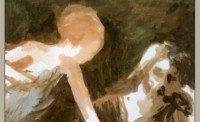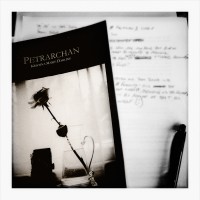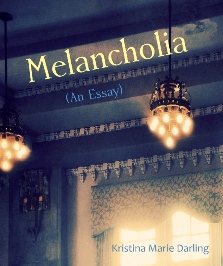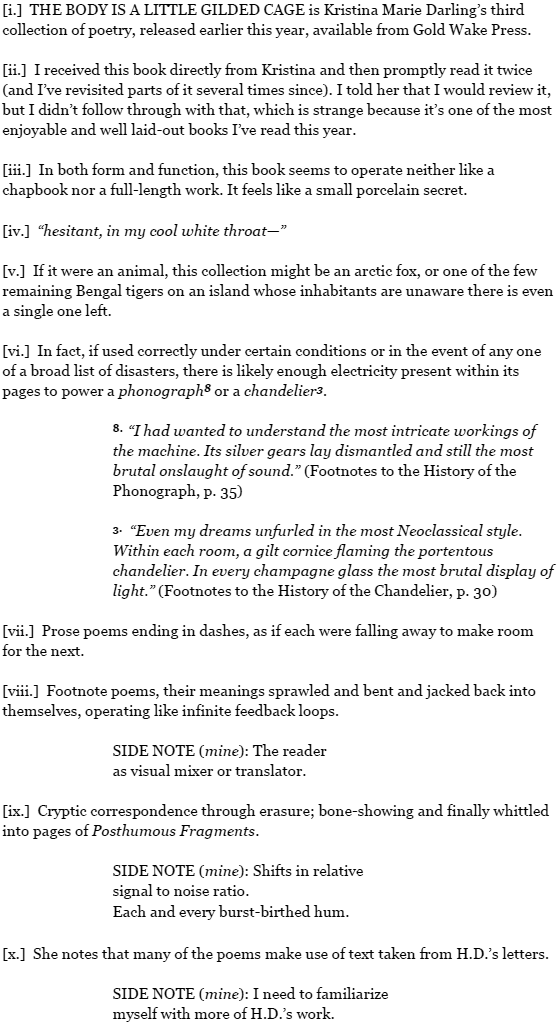25 Points: Brushes With
 Brushes With
Brushes With
by Kristina Marie Darling
BlazeVOX [books], 2013
50 pages / $16.00 buy from BlazeVOX or Amazon
1. This is Kristina Marie Darling’s 11th book of poetry; she is not even 30 years old yet.
2. Darling eschews traditional forms of poetry in favor of her own unique formal constraints: the use of footnotes, appendixes, images, definitions, bracketed verse, and erasure poetry. However, in Brushes With, Darling adds a new form to her repertoire: the narrative prose poem.
3. The collection begins: “We were no longer in love. The sky, too, was beginning to show its wear.” From this point forward, readers are plunged into many complex layers of the rubble of abandonment and loss.
4. The footnotes serve as historical commentary on the prose text. This makes for a matrix-like experience. We are reading a person’s intimate words, but we also know that this text has been abandoned, then found, then studied, then put on display. This technique makes the experience of reading the prose poems feel illicit in some way. We are peering into a labyrinth of secrets that are not meant for our eyes, yet are now uncomfortably preserved and public.
5. Even while reminiscing on the relationship before its end, the speaker foreshadows doom: “You told me there was dark matter I couldn’t see. That every star is a dead star.”
6. The imagery, like the one above, proves to be richly complex. All stars are dead; therefore, that which enchants us, that which we wish upon, that which we map out, gaze upon, pray to, is also doomed. In every romantic union, there is something dark that we don’t see coming, yet we should be aware that it’s there.
7. In “Feminism,” the speaker states: “I began to realize the significance of this gesture. What is love but a parade of memorable objects, a row of dead butterflies pinned under glass?” Ouch!
8. The speaker’s take on love is relentlessly jaded, yet she comes to sharp edged truths. What is love but our desire to possess, collect, admire. Yet, in doing so, we must sacrifice the subject’s life.
9. Footnote 18. ‘This statue of the Holy Mother would later be found headless in a tiny museum in northern France.” Once again, we have worship, mementoes, collection, ownership—all leading to destruction. Facelessness.
10. The marriage documented in the book unravels due to affairs. READ MORE >
August 20th, 2013 / 5:22 pm
25 Points: Petrarchan
 Petrarchan
Petrarchan
by Kristina Marie Darling
BlazeVOX [books], 2013
72 pages / $16.00 buy from BlazeVOX or Amazon
“Within every box, I found only compartment after compartment.”
1. Petrarchan is Kristina Marie Darling’s 8th book, published by the ever controversial Blaze Vox Books. (Yikes. Remember that whole thing? I still have love for the Vox, though.)
2. Much in the way she “took liberties with H. D.’s letters” in THE BODY IS A LITTLE GILDED CAGE, Darling uses ekphrasis, careful appropriation, erasure, and the work of Petrarch and Sappho (the latter, via Anne Carson’s translations) to achieve her grand illusion.
3. Kristina Marie Darling’s voice as a writer is unmistakable and unshaken regardless of mode or form. Of this, I am thoroughly convinced.
4. In fact, one thing that has repeatedly struck me about Kristina is how much larger in stature her writing voice is than its author. To be clear, this is not to reduce her as a person, but to exemplify her work as a force. Often, in an effort to amplify one’s voice over the din of modern media, the artist must become a personality first in order to gain potential interest in the work. Unfortunately, it becomes easy for the latter to suffer in the shadow of the former in the race. Darling reminds me that there is still a strong argument to be made as an artist for placing one’s ambitions squarely on the body of one’s art.
5. This is to say that I have no idea whose parties she attends, under which influences, et cetera, but I damn sure know when it’s her voice there on the page.
6. The reader will find in Petrarchan Darling’s familiar signature use of spare narrative and spectral imagery driving a carefully plotted course of marginalia and footnotes. To be fair, it is doubtful that anyone who is unconvinced or maybe even still undecided about her work in general will be swayed by Petrarchan. However, those of us who are believers or even simply interested parties will take comfort in knowing that what is gold still shines.
7. Tangentially, I have been thinking a lot about appropriation and erasure lately. As a writer who uses both at times almost criminally, I think a lot about what constitutes successful employment. After all, as some will invariably argue, can’t anyone do it? The short answer, of course, is yes. But to make a piece of erasure or other appropriation both successful and original despite its sources, I believe what the author chooses not to use, and why, becomes equal in importance to what is used, and how. The author must rely on the source text to some degree, but the artistic voice of the finished piece should stand on its own. Darling’s work—and Petrarchan is no exception—is as fine an example as any to underline these values.
8. I am thinking about corridors—hands and bricks or wood and the long-form sound of feet moving to some god knows where. I think about corridors a lot I think. I wonder if Kristina does too.
9. It is often easy to forget how the author implies a larger body of text with her use of marginalia as sparse narrative, set toward the bottom of the page, soaking up the white space of the specter it has picked apart.
10. Again, the ghostly presence hovering in the frame of the footnoted sections is largely the work of Francesco Petrarch, whose work I am largely unfamiliar with. I should really make it a point to change that. READ MORE >
August 13th, 2013 / 12:09 pm
Announcing Requited Journal #8
It is my pleasure to tell you that Requited #8 is now online. This issue features:
- Fiction by Thomas Mundt, Berit Ellingsen, and Matt Rowan;
- Poetry by Lucy Biederman, Carol Guess & Kristina Marie Darling, Gillian Cummings, Zachary Scott Hamilton, Kamden Hilliard, Kati Mertz, M. Pfaff, Amanda Silbernagel, and Michelle Sinsky;
- Performance pieces by Marisa Plumb, Dave Snyder, and Brian Torrey Scott;
- Visual art by Tyler Mallory (including the image you see above);
- Jeff Bursey’s review of Sam Savage’s Glass.
Check it out!
. . .
I am the non-fiction and reviews editor for Requited and am always eager to consider submissions. Previously I’ve published work by William Bowers, Jeremy M. Davies, Julianne Hill, Steve Katz, Mark Rappaport, Keiler Roberts, Viktor Shklovsky, and Curtis White, as well as interviews with Robert Ashley, Vanessa Place, Rosmarie Waldrop, and Curtis White, and reviews by Daniel Green and Jeff Bursey.
Also, please do check out the Requited‘s steadily swelling archives, where you’ll find poetry by Molly Gaudry and Nate Pritts, fiction by James Tadd Adcox, Jimmy Chen, Jac Jemc, Tim Jones-Yelvington, Suzanne Scanlon, and (ahem) myself, as well as many other nice fine things.
Enjoy!
Melancholia (An Essay) by Kristina Marie Darling
 Melancholia (An Essay)
Melancholia (An Essay)
by Kristina Marie Darling
Ravenna Press, 2012
72 pages / $10 Buy from Ravenna Press
Parenthetically titled “An Essay,” Kristina Marie Darling’s Melancholia is a collection of prose poems, independent lines, notes, and fragments. Prose poetry and essays are not imperfect bedfellows. Samuel Johnson defined the essay form as “A loose sally of the mind: an irregular indigested piece; not a regular and orderly composition.” His definition sounds appropriate to the form’s modern originator, 16th century French writer Michel de Montaigne, whose works unfold as scattered meditations on words and concepts. Yet Johnson’s definition is also curiously apt as a description of contemporary prose poetry. Often lacking a central narrative, prose poems typically contain development of breadth rather than depth. Darling solves that problem by using the prose poem form to link imagistic snapshots that accumulate the work’s emotional content.
Yet Melancholia is difficult to classify. Its structural form is prose poetry, its conceptual mode is almost filmic, and its narrative mode owes much to the essay’s tendency to classify and define. Melancholia posits that a poet-narrator is a good choice to “select and omit”: Darling’s prose poems are more concerned with absence than presence, as white space outweighs text within the book. Such ratio is not shocking in a volume of poetry, but the prose poetic form reestablishes the physical page in poetry. When a poet reaches for the margins in her sentences, her later abbreviations become more obvious. Darling has a nice sense of the physical page, and Ravenna Press’s pocket series, at roughly 6 by 5 inches, is the right size for a typographically spare collection.
Darling’s complicated form mirrors her complicated content. Melancholia documents a fragmented relationship in a previous, possibly Victorian, era. Time is ambiguous in the collection: although the overarching narrative occurs in an epoch of cufflinks and corsages, the work references a “little-known French film, in which the heroine makes her living by keeping nightingales,” and another, equally obscure film, where “a woman refers to her beloved as a ‘strange machine.’” This confusion about time arises from the poet’s role as essayist. Darling’s core narrative is centered on a feuding, and later separated, couple, but she overlays that narrative with fragments of fact. Her reason for bending form is tied to her title: melancholy lacks the sharp edges of anger and sadness. It is a paradoxical feeling of heft and weightlessness, so a poet would be smart to mix poetry and fact as she struggles to understand pain.
January 14th, 2013 / 12:00 pm
25 Points: The Body is a Little Gilded Cage: A Story in Letters and Fragments
 The Body is a Little Gilded Cage: A Story in Letters and Fragments
The Body is a Little Gilded Cage: A Story in Letters and Fragments
by Kristina Marie Darling
Gold Wake Press, 2012
56 pages / $12.95 buy from Amazon
November 13th, 2012 / 9:09 am


